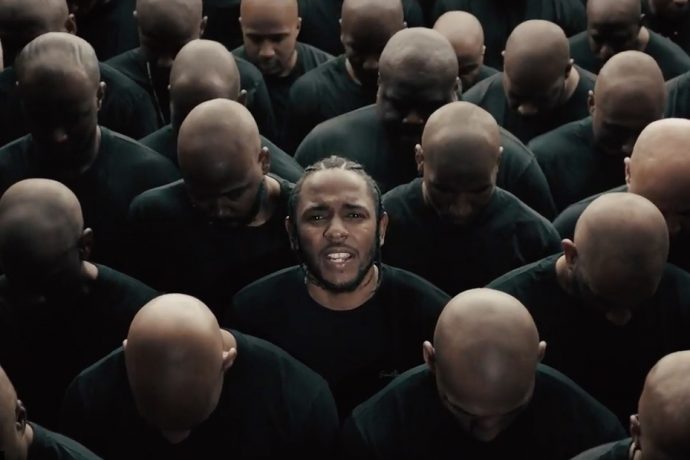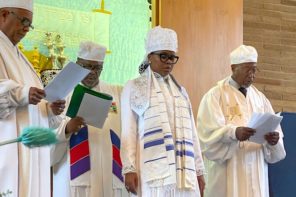Kendrick Lamar’s fourth album, Damn, (stylized “DAMN”) has been number one on the Billboard charts for the past three three weeks. The first track, “HUMBLE,” caused an immediate stir, with verses praising stretch marks and natural beauty. But it’s the record’s third track, “YAH,” that drew my attention and caused a moment of pause as it appears Kendrick Lamar has embraced a stream of African American religious thought commonly referred to as Black Judaism:
I’m not a politician, I’m not ’bout a religion
I’m a Israelite, don’t call me Black no mo’
That word is only a color, it ain’t facts no mo’
The Forward‘s Sam Kestenbaum writes this week that Lamar’s “cousin Carl Duckworth” (who now goes by Karni Ben Israel) is a member of Israel United in Christ (IUIC) in Florida. As Kestenbaum reports,
Israel said he and his cousin regularly study the Bible together — and it was one passage in particular that moved Lamar.
“When Deuteronomy 28 came out, it was like he was blown away, it was like — wow,” Israel said.
Black Jews and Hebrew Israelites believe that they are genealogical descendants of the biblical tribes of Israel. This belief is supported by an intricate biblical exegesis of Deuteronomy 28 as a prophecy of the enslavement and forced migration of African peoples to the western hemisphere.
My cousin called, my cousin Carl Duckworth
Said know my worth
And Deuteronomy say that we all been cursed
There is much packed into this passage.

IUIC logo
Although Black Jews and Hebrew Israelites are a diverse collection of congregations and groups there are underlying beliefs that bind this fragmented religious tradition together. The Israeli School of Universal Practical Thought (ISUPK), founded in 1969 by a figure known as Abba Bivens in New York, has often courted controversy and condemnation through its use of highly confrontational street preaching demonstrations. This group has splintered over the past two decades into offshoots such as IUIC, which are located throughout major American cities and have a considerable presence in social media.
Hip hop is no stranger to marginalized iterations of African American religion. Early hip hop was imbedded with Islamic references from Sunni Islam, the Nation of Islam and the Nation of Gods and Earth (Five-Percenters). Rappers often peppered lyrics with references to Malcolm X, Minister Louis Farrakhan and invoked popular Five-Percenter teachings. In terms of the Christian tradition, hip hop icon KRS-One of Boogie Down Productions questioned the whitewashing of biblical personalities in “Why Is That?” arguing on wax Afrocentric ideas about the fundamental connections among the Bible, the African continent, and its people.
Unlike its Islamic sibling, however, Black Judaism has had a considerable lower profile within the rap corpus.
The album songs, “YAH” and “FEAR” feature the hallmarks of ISUPK-type Hebrew Israelite doctrine: the “forgotten” Israelite ancestry of African Americans and, more importantly, that African Americans are subjects of a divine curse. The song “FEAR” opens with a recorded voicemail message from his cousin, informing Kendrick:
I don’t think I could find a way to make it on this earth. What’s up, family? Yeah, it’s ya cousin Carl, man, just givin’ you a call, man. I know you been havin’ a lot on ya mind lately, and I know you feel like, you know, people ain’t been prayin’ for you. But you have to understand this, man, that we are a cursed people. Deuteronomy 28: 28 says, “The Lord shall smite thee with madness, and blindness, and astonishment of heart.” See, family, that’s why you feel like you feel like you got a chip on your shoulder. Until you finally get the memo, you will always feel that way.
In “FEAR,” Carl Duckworth’s admonishment to Kendrick Lamar Duckworth about the nature of Black life—even for a successful hip hop artist—reminds us that even financial security cannot soothe the existential angst that affects so many African Americans.
Lamar is not the first mainstream hip hop artist to weave Hebrew Israelite beliefs into his lyrics. The late 1990s saw Wu Tang Clan associate Killah Priest and his label mates Sunz of Man weave together a tapestry of Hebrew Israelite and Five-Percenter beliefs effortlessly and seamlessly that seemed apropos for the apocalyptic fear associated with the approaching millennium at the end of the 1990s. Former St. Louis rapper Chingy, who achieved stardom with the hit song “Right Thurr,” later abandoned mainstream hip hop, adopted the Hebrew Israelite faith and recorded the track “King Judah” dedicating his music career to spreading the Hebrew Israelite message.
In a social and political climate that has produced the “Black Lives Matter” movement, to witness a rapper of Kendrick Lamar’s status eschewing “Black” in favor of “Israelite” would seem to be a rejection of the current political ethos. However, it is precisely during these types of political moments that Hebrew Israelite doctrines appeal to disenchanted segments of the African American community.
The ultimate failure of the Obama years to deliver African Americans to the proverbial Promised Land and the subsequent racist backlash has attracted a new generation of African Americans seeking answers. Why after the historic election of the nation’s first African American president has an avalanche of racist violence been unleashed?
It is here that Hebrew Israelite groups like IUIC offer a ready-made answer: Deuteronomy 28, a chapter that outlines a set of curses that will befall the Israelites if they disobey the commandments of their God.
Kendrick Lamar concludes the song “FEAR” with a second sample from Duckworth:
Verse two says, “you only have I known of all the families of the Earth, therefore I will punish you for all your iniquities.” So until we come back to these commandments, until you come back to these commandments, we’re gonna feel this way, we’re gonna be under this curse. Because he said he’s gonna punish us, the so-called Blacks, Hispanics, and Native American Indians, are the true children of Israel. We are the Israelites according to the Bible. The children of Israel, he’s gonna punish us for our iniquities, for our disobedience, because we chose to follow other gods that aren’t his son, so the Lord, thy God, chasten thee. So, just like you chasten your own son, he’s gonna chastise you because he loves you. So that’s why we get chastised, that’s why we’re in the position we’re in. Until we come back to these laws, statutes and commandments, and do what the Lord said, these curses are gonna be upon us. We’re gonna be at a lower state in this life that we live here in today, in the United States of America. I love you, son, and I pray for you. God bless you, Shalom.
Lamar and his cousin are confronting a question raised by philosopher of religion William R. Jones in Is God a White Racist?: “What is the cause and purpose of black suffering?”
This question is of paramount importance to African American religion. And as Anthony Pinn has demonstrated (in Why Lord? Suffering and Evil in Black Theology) it is usually articulated in some form of redemptive suffering that maintains belief in a benevolent deity in the face of catastrophic ethnic suffering and moral evil against Black people. In Islam and the Blackamerican, scholar Sherman A. Jackson has labeled this formulation, a “black theodicy.”
Given a renewed sense of despair among many African Americans it is far from surprising that Kendrick Lamar and other celebrities would embrace aspects of Hebrew Israelite beliefs. Those beliefs argue that political struggle and activism are pointless in a white supremacist society. They regard the problem as a result of a spiritual degradation afflicting not only African Americans, but also Native Americans and, as their material claims, “Hispanics.” These populations. they reason, comprise the “real” tribes of Israel and are suffering from a trans-generational set of curses that includes a “loss” of their real ethnic identity and religion.
Historian Sylvester Johnson refers to this as the “ethnic turn” in early twentieth-century Black religions, in which African-Americans began to reject the term “Negro” in favor of ethno-religious identities such as “Moor,” “Muslim,” “Israelite,” or “Ethiopian Hebrew.”
What explains the 21st century embrace of Hebrew Israelite beliefs by artists like Kendrick Lamar? According to prominent Chicago anti-violence activist Tamar Manasseh—whose own Black Jewish background has served as a source for anti-violence strategies—Israelite beliefs and practices have become more attractive to younger unaffiliated African Americans who are disappointed by the inability of the traditional Black Church to curb violence or offer transformation.
Likewise, she argues that the rhetoric of the Nation of Islam—which has its national headquarters in Chicago—has also worn thin on many Black residents, failing to address their daily experiences with violence and injustice.
Just recently, Manasseh hosted a “Seder in the Streets” this past Passover in which members of the Chicago Jewish and African American community took part in the yearly ritual together—not in shining banquet hall but in the heart of the South side Chicago neighborhood of Englewood. Rather than inviting prominent African American preachers and Jewish rabbis for an interfaith photo-op, Manasseh hosted everyday people to share their communal “bread of affliction.”
Rather than teaching about divine curses and lost identities Manasseh has used her Jewish background and education to offer symbols and rituals to families mourning the loss of loved ones lost to gun violence.
Whether it is because of IUIC YouTube clips or prominent rappers’ public embrace it seems that Hebrew Israelite beliefs are experiencing a renaissance within a cross section of African Americans. This is compounded by the failure of American democracy to deliver on its promises of an inclusive society with equality before the law.
As long as other Black religious traditions fail to offer answers to questions of Black suffering, small but significant numbers of Black people will seek refuge in beliefs that offer an alternate theological explanation for the crisis of Black life in America.





